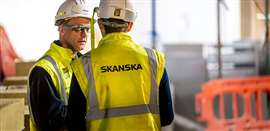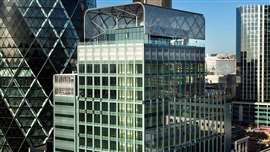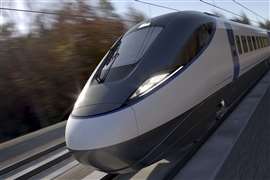Interview: Skanska UK VP outlines how the company is championing sustainability and inclusivity
30 July 2024
Swati Paul, executive vice president at Skanska UK, outlines how the company has been championing sustainability initiatives across the past couple of decades and why the way the industry recruits women needs to change.
 Swati Paul, executive vice president at Skanska UK (Photo: Skanska UK)
Swati Paul, executive vice president at Skanska UK (Photo: Skanska UK)
The recent general election in the UK, which took place on 4 July, has brought about significant changes to the country’s political landscape and will have a profound impact on future plans.
This will impact the construction industry and bring about fresh challenges and opportunities. Swati Paul, executive vice president at Skanska UK, highlights that when you look at things from a macro perspective, the political uncertainty and its consequent economic impacts, including wider effects on inflation, pose quite a challenge for Skanska and many other businesses.
Paul adds that the company has numerous clients in the public sector, and the company is involved in projects such as high-speed rail, national highways, and Network Rail.
“Political uncertainty also affects our private sector clients, as people are hesitant to invest,” says Paul. “I think that everyone in the country, for various reasons, would prefer a stable political situation so that they can plan for the future. The previous disarray was undoubtedly causing frustration for many, and I think the impacts of that are being felt widely.”
Different political parties across the UK debated various topics that ultimately impact the way contractors and OEMs run their businesses. This includes improving vocational training and apprenticeships to alleviate the skills shortage, increasing building safety, as well as pledging to push greener and more sustainable practices across the built environment.
Decline in skills
The skills shortage is rife across the whole of Europe and Paul suggests that since Brexit – the UK’s departure from the EU, the problem has been made worse.
Paul says, “We used to rely a lot on skilled trades from Europe, and it’s been challenging to find those skills locally. Despite this, I think we are mitigating it because we are focusing on this at Skanska.”
Despite the wider impact of the skills shortage, it was interesting to gauge Paul’s opinion on how the industry can better recruit and retain women. For Paul, it is about seeing role models and other women working across construction.
“In the past, I have been in situations where I was the only woman in the room. Many women do not want to be the only woman in the room or the only woman in the whole company.”
 Skanska UK has been responsible for several diverse projects across London, UK (Photo: AdobeStock)
Skanska UK has been responsible for several diverse projects across London, UK (Photo: AdobeStock)
Interestingly, Paul highlights that half of the executives at Skanska in the UK are women.
“It is unusual,” she says, “in our UK executive management team, three out of six members are women; the CEO, the CFO and me.”
Paul believes that a lack of women in construction has to do with employment policies, particularly for those in the middle stages of their careers.
“Flexible working, diversity, and inclusion are important factors that attract women to workplaces. Values, ethics, and inclusion ensure that women are included and treated well in male-dominated businesses. And I think that it is really important because I’ve worked in businesses where you as a woman, have to fight quite hard to be heard in any kind of environment.”
“There’s a way to go,” acknowledges Paul, “but I think our policies which reflect these issues are really helping with that and with retaining our people.”
Advances in technology
With all European contractors, there is a push to enhance innovation and adopt new technology. Paul sees technology as presenting both challenges and opportunities for the company as well as the wider construction industry.
Skanska has committed to expanding its innovation network over the next five years through its supply chain, innovation partnerships, and collaborative arrangements. The company emphasises that it is already working in partnership on opportunities including 3D concrete printing, robotics, and digital tag and track technology.
Skanska states that they were pioneers in using 3D printed materials on a major London building project and are leading partners in a research group exploring 3D printing.
For the 6 Bevis Marks office project in London, UK the company achieved an industry first with the 3D printed cladding ‘shrouds’ for the top section of the ETFE (a durable, transparent and light-weight material) canopy on the building’s roof terrace.
 6 Beavis Marks project in London, UK (Photo: Skanska UK)
6 Beavis Marks project in London, UK (Photo: Skanska UK)
Despite achieving success so far in the uses of technology, Paul says that she understands that being more proactive with their approach to data and digital will only seek to improve the business further.
Not a new bandwagon
Net-zero and sustainability targets are becoming more common as companies commit to ambitious goals to reduce their impact on the environment by the end of the decade. But this isn’t new for Skanska, Paul claims that the company has been fully dedicated to sustainability for many years.
“We’ve been living and breathing sustainability for decades,” says Paul. “This isn’t a new bandwagon that we’ve just jumped on. For about nearly 30 years we’ve been working on reducing our carbon footprint because it’s the right thing to do.”
“Maybe everyone’s jumped on the sustainability bandwagon, probably in the last three to five years and, of course, it’s the right thing to do, but this is already embedded in our processes. We have a very well-established environment team that has been in place for a long time. We were the first construction company to announce our 2045 net zero.”
In an effort to reach their targets, Skanska has shifted to using hydrotreated vegetable oil to reduce emissions on their sites, plants, and machinery. Additionally, they have converted their fleet vehicles to electric or hybrid models.
Even in the unstable environment of the UK construction industry, Skanska seems to be adjusting to new and modern ways of working despite significant political, economic and environmental pressure. By identifying areas that need improvement, they demonstrate that despite the tough times, there are opportunities to enhance the business for the future.






